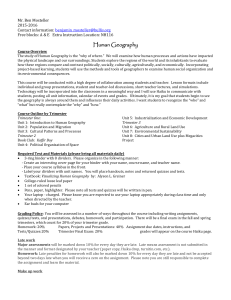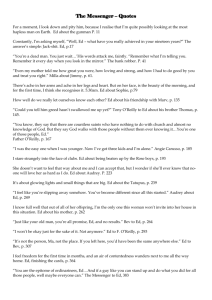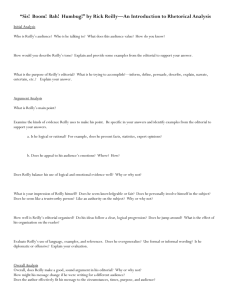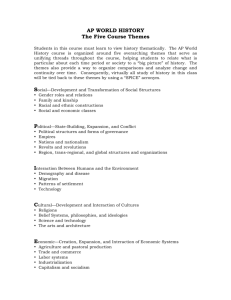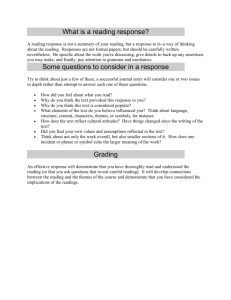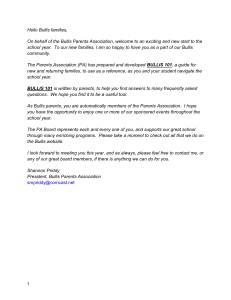AP_World_Syllabus_2015-16
advertisement
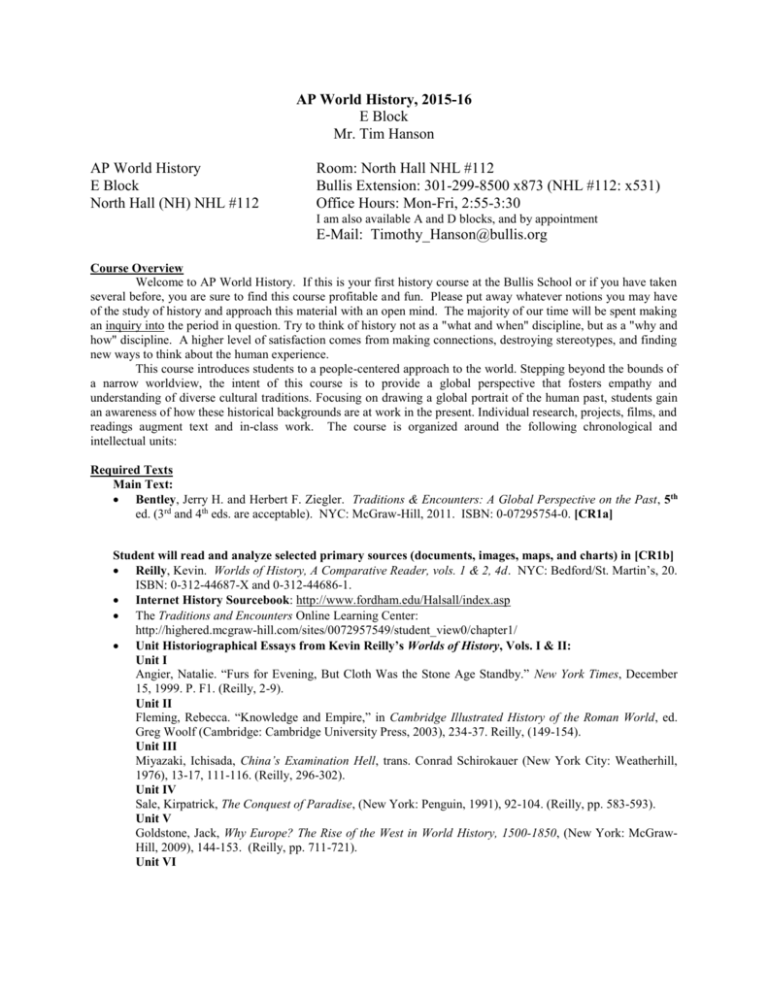
AP World History, 2015-16 E Block Mr. Tim Hanson AP World History E Block North Hall (NH) NHL #112 Room: North Hall NHL #112 Bullis Extension: 301-299-8500 x873 (NHL #112: x531) Office Hours: Mon-Fri, 2:55-3:30 I am also available A and D blocks, and by appointment E-Mail: Timothy_Hanson@bullis.org Course Overview Welcome to AP World History. If this is your first history course at the Bullis School or if you have taken several before, you are sure to find this course profitable and fun. Please put away whatever notions you may have of the study of history and approach this material with an open mind. The majority of our time will be spent making an inquiry into the period in question. Try to think of history not as a "what and when" discipline, but as a "why and how" discipline. A higher level of satisfaction comes from making connections, destroying stereotypes, and finding new ways to think about the human experience. This course introduces students to a people-centered approach to the world. Stepping beyond the bounds of a narrow worldview, the intent of this course is to provide a global perspective that fosters empathy and understanding of diverse cultural traditions. Focusing on drawing a global portrait of the human past, students gain an awareness of how these historical backgrounds are at work in the present. Individual research, projects, films, and readings augment text and in-class work. The course is organized around the following chronological and intellectual units: Required Texts Main Text: Bentley, Jerry H. and Herbert F. Ziegler. Traditions & Encounters: A Global Perspective on the Past, 5th ed. (3rd and 4th eds. are acceptable). NYC: McGraw-Hill, 2011. ISBN: 0-07295754-0. [CR1a] Student will read and analyze selected primary sources (documents, images, maps, and charts) in [CR1b] Reilly, Kevin. Worlds of History, A Comparative Reader, vols. 1 & 2, 4d. NYC: Bedford/St. Martin’s, 20. ISBN: 0-312-44687-X and 0-312-44686-1. Internet History Sourcebook: http://www.fordham.edu/Halsall/index.asp The Traditions and Encounters Online Learning Center: http://highered.mcgraw-hill.com/sites/0072957549/student_view0/chapter1/ Unit Historiographical Essays from Kevin Reilly’s Worlds of History, Vols. I & II: Unit I Angier, Natalie. “Furs for Evening, But Cloth Was the Stone Age Standby.” New York Times, December 15, 1999. P. F1. (Reilly, 2-9). Unit II Fleming, Rebecca. “Knowledge and Empire,” in Cambridge Illustrated History of the Roman World, ed. Greg Woolf (Cambridge: Cambridge University Press, 2003), 234-37. Reilly, (149-154). Unit III Miyazaki, Ichisada, China’s Examination Hell, trans. Conrad Schirokauer (New York City: Weatherhill, 1976), 13-17, 111-116. (Reilly, 296-302). Unit IV Sale, Kirpatrick, The Conquest of Paradise, (New York: Penguin, 1991), 92-104. (Reilly, pp. 583-593). Unit V Goldstone, Jack, Why Europe? The Rise of the West in World History, 1500-1850, (New York: McGrawHill, 2009), 144-153. (Reilly, pp. 711-721). Unit VI Hetate, Sherif, “Dollarization, Fragmentation, and God,” in The Cultures of Globalization, ed. Frederic Jameson and Masao Miyoshi (Durham, NC: Duke University Press, 1998), 273-74, 276-80. (Reilly, pp. 1053-1056). Legrain, Philippe. “Cultural Globalization Is Not Americanization,” Chronicle of Higher Education 49, no. 35 (May 9, 2003): B7. (Reilly, pp. 1057-1060). From Document Based Questions released by the College Board for AP World History Selected Secondary Source Excerpts [CR1c] Standage, Tom. An Edible History of Humanity. NYC: Walker & Co., 2010. ISBN-13: 978-0802719911. Freemen, Philip. St. Patrick of Ireland. NYC: Simon & Schuster, 2004. ISBN: 0-7432-5632-8 (hardback); 0-7432-5634-4 (paperback). Pomeranz, Kenneth. The Great Divergence. Princeton University Press: Revised Edition, 2001). Pomeranz, Kenneth. The World That Trade Created: Society, Culture, And the World Economy, 1400 to the Present. (NYC: M.E. Sharpe, 2nd ed. 2005). A class binder. Please organize in the following manner: 1. Course syllabus in the front. 2. Sections divided by course units where you will place handouts, class notes, assignments, quizzes and tests handed back We also use the Traditions and Encounters Online Learning Center: http://highered.mcgraw-hill.com/sites/0072957549/student_view0/chapter1/ Pens, paper, highlighter Laptop Six Chronological Units of AP World Unit I: Technological and Environmental Transformation, The Foundations, circa 4 million bce to 600 bce Unit II: Organization and Reorganization of Human Societies, The Classical Era, circa 600 bce to 600 ce Unit III: Global and Transregional Interactions, The post-Classical World, 600 c.e. to 1450 c.e. Unit IV: Global Interactions, "The Great Convergence," 1450-1750 Unit V: Industrial and Global Integration, The Long Nineteenth Century, 1750-1914 Unit VI: Accelerating Global Change and Realignments, The Modern World 1914 to the present Five Major Themes of AP World History Theme 1: Interaction Between Humans and the Environment Theme 2: Development and Interaction of Cultures Theme 3: State-Building, Expansion, and Conflict Theme 4: Creation, Expansion, and Interaction of Economic Systems Theme 5: Development and Transformation of Social Structures The themes serve throughout the course as unifying threads, helping students to put what is particular about each period or society into a larger framework. The themes also provide ways to make comparisons over time. The interaction of themes and periodization encourage cross-period questions such as “To what extent have civilizations maintained their cultural and political distinctiveness over the time periods the course covers?”; “Compare the justification of social inequality in 1450 with that at the end of the twentieth century”; or “Discuss the changes in international trading systems between 1300 and 1600 C.E.” The AP World exam is Thursday, May 12th 2016. “Bentley is the information you need, and Reilly is how you will be asked to use it” Themes and AP World History: Students in this course must learn to view history thematically. The AP World History course is organized around five overarching themes that serve as unifying threads throughout the course, helping students to relate what is particular about each time period or society to a “big picture” of history. The themes also provide a way to organize comparisons and analyze change and continuity over time. Consequently, virtually all study of history in this class will be tied back to these themes by utilizing a “SPICE” acronym. [CR2] Social--Development and transformation of social structures • Gender roles and relations • Family and kinship • Racial and ethnic constructions • Social and economic classes Political--State-building, expansion, and conflict • Political structures and forms of governance • Empires • Nations and nationalism • Revolts and revolutions • Regional, trans-regional, and global structures and organizations Interaction between humans and the environment • Demography and disease • Migration • Patterns of settlement • Technology Cultural--Development and interaction of cultures • Religions • Belief systems, philosophies, and ideologies • Science and technology • The arts and architecture Economic--Creation, expansion, and interaction of economic systems • Agricultural and pastoral production • Trade and commerce • Labor systems • Industrialization • Capitalism and socialism Each student will discover a historical artifact that they believe represents the unit and topic being studied. The teacher well set the parameters each unit for these artifacts in order to ensure that students recognize that the study of history has been shaped by the findings and methods of other disciplines (archaeology, visual arts, geography, political science). They will then post an image of the artifact along with a discussion that identifies the artifact (who, what, when, where, why significance) and addresses what the artifact says (indicates, suggests) about politics, society or culture in the time and place it was made. Classmates will then use the elements of critical thinking to organize class discussion via the class Haiku Wiki. Students may start the discussion in one of three areas: Short Primary Source Analysis, World History Posting Assignment, and Quantitative Data Analysis Wikis. In each of the six units, each student in the class will be required to ask a question about the artifacts and documents in each unit that seeks to increase the clarity, accuracy and precision of the historical conversation. The student posting the artifact must then answer the questions posed by their peers. Answering these questions may require further research. Questions and answers should demonstrate that the respective authors put honest thought into both the questions and the answer. Throughout, students must cite the sources of the information provided. The initial artifacts posts are due after the unit has been studied for one week. Classmates writing queries should post their questions from that point until the end of the unit. Course Grading Policies I grade using four weighted categories: Tests, Papers, Projects, and Quizzes/Homework. You will be assessed in a number of ways throughout the course: Tests, 30% Papers, Projects, and Presentations 40% Homework, Quizzes, and Discussions 10% Trimester Final Exam, 20% When a unit is introduced, I will explain how you will be assessed, including the assessments’ point values, and post due dates on my Haiku calendar. Your grades will be updated on Haiku every week. Late work Major assessments will be marked down 10% for every day they are late. Late means assessment is not submitted in the manner and format designated by your teacher (paper copy, Haiku drop, turnitin.com, etc.). Homework will also be marked down 10% for every day they are late and not be accepted beyond two days late when you will receive a zero on the assignment. Please note you are still responsible to complete the assignment and learn the material. Make up work If you have an excused absence, you are expected to meet with your teacher on the day of your return to identify work missed and when you will make it up. All quizzes, tests, and other assessments must be made up within the same time frame as school days missed (i.e. within two school days if you were absent two days, even if your class does not meet). If you have early dismissal, it is your responsibility to make arrangements (conversation, email) with the teacher prior to the actual dismissal to make up missed assignments due that class including quizzes/tests. Notified unexcused absences: Teachers will provide makeup opportunities for students who have missed assignments, tests or quizzes during an acknowledged unexcused absence. Students can earn up to 80% credit on their makeup work. Unexcused absences without notification (class cut): Student will receive a zero for the assignment, test or quiz. Academic Integrity We expect you to stand strong in your integrity. We will not tolerate cheating. Please note that sharing information (between classes) regarding tests or quizzes is considered cheating. Plagiarism--presenting another person's words and ideas as your own--is unacceptable and will not be tolerated. This includes copying another person’s work or ideas (whether print or online), allowing that person to copy yours, or using any previous year’s work. In our opinion, it is better to receive an “F” on an assignment than to cheat. An “F” signifies a lack of preparation, but cheating signifies a lack of integrity and judgment. The Social Studies department views turnitin.com, an online writing service, as a teaching tool for responsible scholarship and as a support for the Bullis Honor Code. The Social Studies department requires students to submit academic, analytical, and/or research-based writing to this service to help students learn effective revision techniques as well as citation protocol. In addition, Turnitin.com is a tool to emphasize intellectual integrity as work submitted for assessment is subject to Bullis School policy regarding plagiarism. CLASSROOM EXPECTATIONS Classroom Expectations: BE PROMPT, BE PREPARED, BE PRODUCTIVE, BE POLITE You will be expected to use your laptop appropriately during class time following the teacher’s directive. This includes remaining offline (until directed otherwise) not playing computer games, not being on Facebook and other social networks, and not listening to music. Come ON TIME in Bullis uniform prepared to participate actively. Jackets off please! Complete all readings and assignments on time and thoroughly. Check GMAIL email daily Be respectful of one another! We will talk about sensitive issues throughout the course and all opinions of students will be welcomed. Our classroom will be a safer space. Eating is prohibited in the classroom. Water bottles are allowed. Gum is not to be heard, seen or smelled in the classroom. Food is prohibited, although water bottles are allowed. Please treat this classroom with respect and clean up after yourself. Use the restroom before coming to class. I will not let you out in the middle of class unless it is a DIRE emergency as this disrupts me, the class, and your own learning. Type all homework and other assignments unless otherwise specified. Headings should follow MLA format (double-spaced). No extra credit assignments are allowed, and no work is accepted after the trimester ends (unless it is involved in a prearranged incomplete, which is another issue). Make-up exams and work will be handled at the instructor's discretion. When a student is absent and misses a test, quiz or in-class assignment, the work is to be completed upon his/her return to school. LATE POLICY: Major assessments will be marked down 10% for every day they are late. Late means assessment is not submitted in the manner and format designated by your teacher (paper copy, Haiku drop, turnitin.com, etc.). Late penalties for homework will also be marked down 10% for every day they are late. They will not be accepted beyond two days of their due date. You will not be allowed to make up work (or a quiz/test) if the absence is unexcused. Final Note: Students who have learning and/or physical disabilities should discuss academic accommodations with me as soon as possible. Papers and Projects There will be several papers and essays throughout the year. Papers are to be formatted in Chicago style, typed, double-spaced, with one-inch margins, with proper citation (either footnotes or endnotes), and a title page. Failure to properly cite is considered plagiarism, even if unintentional. If in doubt, CITE! If for nothing else it is a common courtesy to your fellow scholars. Lecture notes do not need to be cited. Consult your Chicago stylebook or go to the following website, http://www.aresearchguide.com, if you have any questions. There will be several major paper projects during the year, such as a series of student-led Discussion papers on major themes and historiography papers from our Reilly readings, biography of a city analysis, and student-constructed DBQs covering units of WHAP and are described as follows: SUMMER READING ASSIGNMENT The summer reading assignment is An Edible History of Humanity, a short monograph of the influence of food on human history by Tom Standage that explores how food has continued to change human history over the past 10,000 years. After reading the Standage book, you are to write a 4-page paper on the free response question below, due Wednesday, 9 September 2015: “Based on your understanding of An Edible History of Humanity, write an essay that compares and contrasts the political and social influence of food on global human society as discussed in Chapter Seven, “New World, New Foods” with any ONE of the following chapters: Chapter Five, “Splinters of Paradise” Chapter Nine, “The Fuel of War” Chapter Ten, Food Fight” You must use Chapter Seven and ONE of the other chapters mentioned above in you comparative paper. Depending on which chapters you choose to compare and contrast, you may have more comparisons or contrasts, but you will certainly be able to have both. Your paper must have at least three direct comparisons and three direct contrasts. As this is a 4-page paper, your essay is not expected to be exhaustive of the information, but, rather reflecting your analysis of the influence of food on human societies at various points in world history. Again, the paper is due at the start of class on Wednesday, 9 September 2015 You can get An Edible History of Humanity at local bookstores, order it online at Amazon.com or Barnesandnoble.com, or through the Bullis Bookstore. The complete citation for the book is: Standage, Tom. An Edible History of Humanity. NYC: Walker and Company, 2010. ISBN: 978-0-8027-1991-1.
